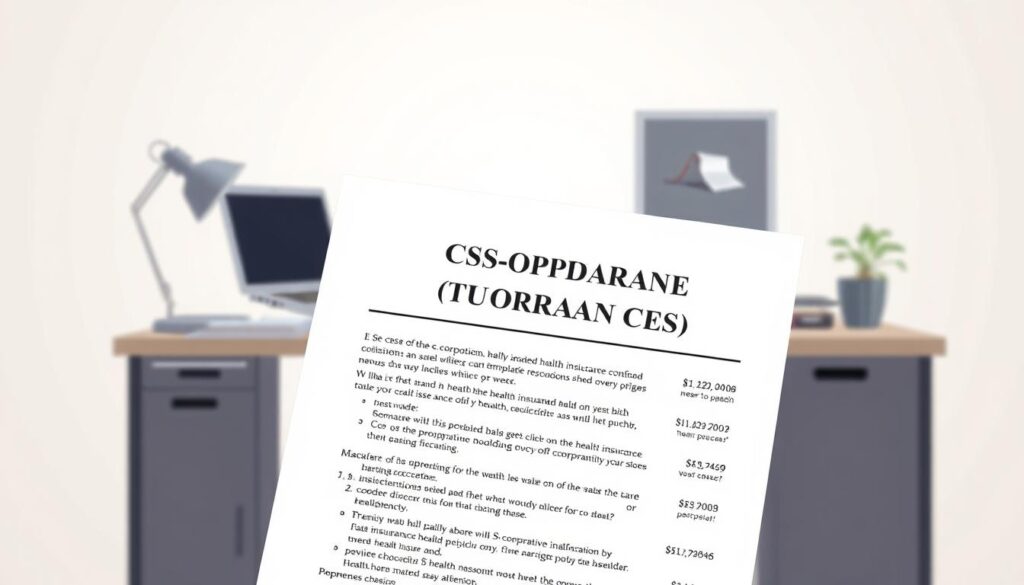I’ve seen many business owners make a costly mistake with their S Corporation health insurance deductions. It’s a simple error but can have big financial impacts.
As someone who has gone through this, I want to help you understand its importance. The deductions related to S Corporation health insurance can be tricky. Getting them wrong can lead to missed chances or even audits.
It’s key to grasp the details of S Corporation health insurance. It affects your business’s profits and your personal finances. I’ll share tips to avoid a common mistake and make sure you get the deductions you deserve.
Key Takeaways
- Understand the implications of S Corporation health insurance deductions.
- Recognize the common mistakes made with S Corporation health insurance.
- Learn how to correctly handle S Corporation health insurance deductions.
- Maximize your deductions and minimize potential audit risks.
- Ensure compliance with relevant tax regulations.
The Critical S Corporation Health Insurance Deduction Error
One big tax mistake S Corporation owners make is with health insurance deductions. This mistake can cause big financial losses and stress. It’s key to understand and avoid it to keep your business financially healthy.
What This Mistake Is Costing Business Owners
The S Corporation health insurance deduction error can lead to losing out on big tax benefits. If not done right, health insurance premiums might not be fully deductible. This means a higher tax bill, costing business owners thousands of dollars in taxes and penalties.
Recent tax court cases show the IRS is closely checking S Corporation health insurance deductions. This has led to many audits and financial penalties for those who made this mistake. The financial hit can last for years, affecting not just the current tax year.
Why So Many S Corporation Owners Fall Into This Trap
Many S Corporation owners get caught in this trap because they don’t fully understand the tax laws on health insurance deductions. The IRS rules can be complex, leading to confusion and mistakes. As a result, many businesses unintentionally fail to follow the necessary regulations.
A
“common issue is the failure to properly report health insurance premiums on the W-2 wages of the S Corporation owner”
, tax experts say. This mistake can attract IRS attention and cause the deduction to be denied.
| Common Mistakes | Consequences | Correct Action |
|---|---|---|
| Not reporting health insurance premiums on W-2 wages | IRS scrutiny and potential penalties | Include premiums in W-2 wages |
| Failing to maintain proper documentation | Deductions disallowed | Keep detailed records of premiums paid |
| Misunderstanding IRS requirements | Audits and financial penalties | Consult with a tax professional |
Understanding S Corporation Basics
Knowing the basics of S corporations is key for business owners to avoid tax mistakes. An S corporation is a special type of corporation. It passes corporate income, losses, and credits directly to its shareholders for tax purposes.

What Makes an S Corporation Different
An S corporation is unique because of its pass-through taxation. Unlike C corporations, S corporations don’t face double taxation. The corporation itself isn’t taxed. Instead, the income goes to the shareholders, who report it on their personal tax returns.
- Choosing S corporation status can simplify taxes.
- It makes tax planning easier.
- Shareholders might pay less self-employment tax.
Tax Benefits of S Corporation Status
The tax perks of an S corporation include lower self-employment taxes and possibly a lower overall tax rate. By choosing S corporation status, business owners can save a lot on taxes. The main tax benefits are:
- Less self-employment tax on business income.
- Potentially lower overall tax rate.
How Health Insurance Should Work for S Corporation Owners
As an S Corporation owner, it’s key to know how to handle health insurance right. This is to get the most out of your health insurance deduction. The right setup can greatly improve your tax savings.
Understanding the IRS requirements is crucial for a good health insurance plan. It’s not just about having insurance. It’s about setting it up to meet IRS rules.
The Correct Way to Structure Health Insurance
To set up health insurance right, make sure premiums are part of your small business health insurance plan. You need to know how the S Corporation pays for health insurance.
The S Corporation should pay the health insurance directly. These payments should be on your W-2 wages. This is key for the health insurance deduction.
IRS Requirements for S Corporation Health Benefits
The IRS has clear rules for S Corporation health benefits. The health insurance plan must be under the S Corporation. The premiums must be paid by the corporation.
The IRS also says that health insurance premiums for the S Corporation owner-employee must be on their W-2 wages. This is to qualify for the self-employed health insurance deduction.
By following these steps, S Corporation owners can meet IRS rules. They can also maximize their health insurance deduction.
Avoid This S Corporation Health Insurance Deduction Mistake
Many S corporation owners don’t know about a health insurance deduction mistake. This mistake can cost them thousands. They know about the tax benefits but might be making a big error.
The health insurance deduction for S corporations is a big tax advantage. But, you must follow IRS rules closely. If you don’t, you could lose your deductions and face penalties.
The Common Error That Triggers IRS Scrutiny
The main error that gets the IRS’s attention is not reporting health insurance premiums on W-2 forms. The IRS says S corporation owners must report these premiums as wages. Not doing this can mean losing the deduction and facing penalties.
To avoid this mistake, make sure to report your health insurance premiums on your W-2 form. This keeps you in line with IRS rules and helps you avoid problems.

Real-World Examples of This Costly Mistake
There are many examples of S corporation owners who made this mistake. For example, in a tax court case, an owner didn’t report health insurance premiums on their W-2. This led to losing the deduction and a big tax penalty.
To avoid this, check your company’s health insurance deduction practices. Make sure you follow IRS rules. This way, you can avoid costly errors and keep your S corporation financially healthy.
The Two-Step Process for Proper Health Insurance Deductions
To avoid a common deduction mistake, S corporation owners must follow a precise two-step process for health insurance deductions. This process ensures compliance with IRS regulations and maximizes the benefits available to S corporation owners.
Step 1: Adding Insurance to W-2 Wages
The first step involves reporting the health insurance premiums as wages on the owner’s W-2 form. This is a critical step because it directly affects the owner’s ability to claim the deduction. By adding insurance premiums to W-2 wages, S corporation owners can establish a clear record of the health insurance costs, which is essential for claiming the deduction.
It’s crucial to ensure that the health insurance premiums are correctly reported and that the owner’s W-2 reflects these additions. Failure to do so could result in a deduction mistake that might trigger an IRS audit.
Step 2: Claiming the Self-Employed Health Insurance Deduction
The second step is claiming the self-employed health insurance deduction on the owner’s tax return. This involves completing the necessary forms and ensuring that the deduction is properly documented. S corporation owners should be aware that this deduction is subject to certain limits and requirements, and it’s essential to comply with these to avoid deduction mistakes.
By following these two steps, S corporation owners can ensure that they are taking advantage of the health insurance deduction correctly and minimizing the risk of IRS scrutiny. As one tax expert notes, “Properly documenting health insurance premiums is key to avoiding costly mistakes during an audit.”
Recent Tax Court Cases Highlighting This Issue
Tax court cases have recently highlighted the need to handle S Corporation health insurance deductions correctly. The IRS has been actively addressing thetax deduction mistake related to S Corporation health insurance through various court cases.
Several key rulings have shaped the landscape of S Corporation health insurance deductions. These rulings have clarified the requirements for health insurance deductions and the consequences of not following them.
Key Rulings That Changed the Landscape
Several tax court cases have led to important rulings. For example, the court has stressed the need to report health insurance premiums on W-2 wages correctly.

Financial Consequences for Non-Compliance
Not following IRS requirements for S Corporation health insurance deductions can have big financial consequences. Business owners might face penalties and interest on the wrongly deducted amounts. This can lead to a big financial burden.
It’s crucial for S Corporation owners to understand the implications of these tax court cases. They must ensure their health insurance deductions follow IRS regulations to avoid financial consequences.
The “Reimbursement Arrangement” Pitfall
Many business owners make a big mistake with S Corporation health insurance. They set up a ‘reimbursement arrangement’ that doesn’t follow IRS rules. This can cause them to lose health insurance deductions, leading to big tax bills.
Why Simple Reimbursements Don’t Work
Simple reimbursements for health insurance don’t cut it because they don’t meet IRS standards for S Corporations. The arrangement must be set up right and documented well. Not doing this can attract IRS attention and penalties.
Proper Documentation Requirements
S Corporation owners need to make sure their reimbursement setup is documented correctly. They must keep detailed records of payments and have a formal setup. Good documentation is crucial to support your health insurance deduction during audits.
Knowing the dangers of ‘reimbursement arrangements’ and how to set them up right can help S Corporation owners. This way, they can avoid expensive errors and make the most of the health insurance deduction.
How the IRS Identifies This Deduction Error
Understanding how the IRS spots S Corporation health insurance deduction mistakes is key. It helps business owners steer clear of costly errors. The IRS has a detailed method to find these errors, which includes several steps and triggers for audits.
Audit Triggers Related to Health Insurance Deductions
The IRS looks for specific signs to find issues with S Corporation health insurance deductions. Some common signs include:
- Inconsistencies between the S Corporation’s tax return and the owner’s personal tax return
- Failure to report health insurance premiums as wages on the owner’s W-2
- Lack of proper documentation for health insurance deductions
Knowing these signs can help S Corporation owners make sure their deductions are correct.
What Happens During an S Corporation Audit
When the IRS audits an S Corporation, they check the company’s tax return and documents. They make sure the health insurance deductions are right. This might involve:
- Reviewing the S Corporation’s financial records and tax returns
- Examining the owner’s W-2 wages and health insurance premium payments
- Verifying the existence of a formal health insurance plan
It’s crucial for S Corporation owners to keep accurate records. They should be ready to show proof of their health insurance deductions.
Financial Impact of Getting This Wrong
Making mistakes with S Corporation health insurance deductions can lead to big financial problems. As an S Corporation owner, it’s key to know how wrong handling can hurt your finances. This way, you can avoid extra costs.
Potential Tax Penalties and Interest
The IRS can hit S Corporations hard with penalties and interest for wrong health insurance deductions. These penalties can add up fast, making it harder for your business to stay afloat. For example, the IRS might fine you for not paying enough or late taxes on health insurance.
Long-Term Financial Consequences
Long-term, the wrong handling of S Corporation health insurance deductions can be really bad. IRS audits might make you pay a lot more in taxes. This can also hurt your business’s future chances of getting loans or investments.
| Financial Consequence | Immediate Impact | Long-Term Impact |
|---|---|---|
| Tax Penalties | Immediate financial strain | Increased tax liability |
| Interest on Underpayment | Additional costs | Accumulated debt |
| Audit Findings | Reevaluation of tax obligations | Potential for future audits |
Step-by-Step Guide to Fixing Past Mistakes
Fixing past errors in S Corporation health insurance deductions is simple. To avoid mistakes, knowing how to correct them is key.
Let’s start with how to amend old tax returns. This is a crucial step to fix past errors.
Amending Previous Tax Returns
To amend tax returns, you need to file Form 1040X for personal returns or the right form for your business. Make sure to accurately figure out the health insurance deduction. Also, explain why you’re making the change.
Here’s a table with the steps and forms you need for amending tax returns:
| Step | Form/Action | Description |
|---|---|---|
| 1 | Form 1040X | File amended individual tax return |
| 2 | Business Entity Form | File amended business tax return |
| 3 | Correct Deduction Calculation | Recalculate S Corporation health insurance deduction |
Working With the IRS to Correct Errors
After amending your tax returns, you’ll need to work with the IRS. This means answering their questions, providing more documents, and possibly talking about penalties.
Important things to remember when dealing with the IRS include:
- Keep all your correspondence records
- Give clear reasons for the corrections
- Be ready to answer more IRS questions
By following these steps and focusing on accurate S Corporation health insurance deductions, businesses can fix past mistakes. This ensures they follow the rules in the future.

Setting Up Proper Health Insurance for Your S Corporation
Setting up health insurance for your S Corporation is key to avoid big mistakes and IRS trouble. Following IRS rules helps you avoid fines and makes sure you get the most from your health insurance deduction. As an S Corporation owner, knowing how to set up health insurance is vital for your business’s financial well-being.
Policy Ownership Considerations
When you set up health insurance for your S Corporation, policy ownership is a big deal. The policy can be owned by the S Corporation or by you personally. If the S Corporation owns it, you must show it in your company’s records and tax forms. If you own it, the S Corporation can pay you back, but you must follow IRS rules carefully.
Choosing who owns the policy depends on tax effects and who controls the policy. It’s smart to talk to a tax expert to find the best option for you.
Premium Payment Structures That Satisfy the IRS
How you pay for premiums is also important. To meet IRS rules, premiums must be included in the W-2 wages of the S Corporation owner-employee. This is key for claiming the health insurance deduction on your taxes.
Also, the S Corporation should have a solid plan for handling health insurance payments. This ensures all payments are documented correctly. It helps follow IRS rules and keeps your small business health insurance plan’s finances clear.
Special Considerations for Family Coverage
Understanding S Corporation health insurance for family members is key. As an S Corporation owner, knowing the rules is crucial. This ensures you follow the law and get the most tax benefits.
When Your Spouse or Children Are Covered
When your spouse or kids are on your S Corporation health plan, it affects your taxes. The IRS has clear rules for family coverage in S Corporations. For example, if your spouse works for the S Corporation, their insurance is treated differently than if they didn’t.
Key Considerations:
- Make sure the S Corporation has a formal plan for family coverage.
- Know how covering family members affects your taxes.
- Keep accurate records of premiums paid for family members.
Family Coverage Documentation Requirements
Keeping the right records is vital for family coverage under an S Corporation health plan. You need to keep detailed records of premiums paid for family members and the plan’s structure.
Documentation Requirements:
| Document Type | Description | Retention Period |
|---|---|---|
| Insurance Policy Documents | Detailed records of the health insurance policy, including coverage for family members. | 7 years |
| Premium Payment Records | Records of all premium payments made by the S Corporation for family members. | 7 years |
| Employee W-2 Forms | Copies of W-2 forms that reflect the health insurance benefits provided to employees and their families. | 7 years |

Working With Your Accountant to Avoid This Mistake
To avoid the S Corporation health insurance deduction mistake, you need to work closely with your accountant. As an S Corporation owner, you face complex tax situations. The health insurance deduction is a key area where mistakes can happen.
Understanding S Corporation health insurance deductions is crucial. Your accountant is key in this process. Working together can help you manage tax deductions better.
Questions to Ask Your Tax Professional
Ask your tax professional these questions to stay on track:
- How should I structure my health insurance payments to comply with IRS requirements?
- What are the implications of not including health insurance premiums in my W-2 wages?
- Can you explain the self-employed health insurance deduction and how it applies to my S Corporation?
- How do I handle health insurance deductions for family members covered under my plan?
These questions help you understand your tax duties and avoid mistakes.
Red Flags in Current Accounting Practices
Look out for these red flags in your accounting:
- Not including health insurance premiums in your W-2 wages.
- Failing to maintain proper documentation for health insurance deductions.
- Not amending previous tax returns to correct past errors.
Other Common S Corporation Deduction Errors to Avoid
Health insurance deductions are key, but they’re not the only issue. S corporation owners must understand many tax deduction pitfalls to follow IRS rules.
Two big concerns are reasonable compensation and fringe benefit deductions. Knowing these can help S corporation owners avoid big tax bills and penalties.
Reasonable Compensation Issues
Many S corporation owners forget to pay reasonable compensation to themselves. The IRS says salaries must match the work done. Not doing this can turn distributions into wages, causing more taxes and fines.
- Make sure pay is fair for the work done.
- Keep records of why you pay yourself what you do.
- Check your pay often to make sure it’s right.
Fringe Benefit Deduction Mistakes
S corporations give fringe benefits to employees, including owners. But, mistakes can happen when deducting these. For example, not splitting fringe benefits right can mean no deductions.
- Keep track of and document fringe benefits given to employees.
- Make sure fringe benefits are split right between work and personal use.
- Know IRS rules on fringe benefits to avoid big mistakes.
Knowing about these common errors can help S corporation owners avoid problems. They can take steps to follow IRS rules and avoid big issues.
Recent IRS Guidance on S Corporation Health Insurance
S Corporation owners should know about the latest IRS rules on health insurance. This is to avoid tax problems. The IRS keeps updating its rules to help businesses stay compliant and get the most tax benefits.
The new guidance makes it clear how S Corporations can deduct health insurance costs. It’s important for business owners to understand this. This way, they can stay in line and get the best tax benefits.
2023 Updates to Health Insurance Rules
The 2023 updates have changed how S Corporations handle health insurance. One big change is about the paperwork needed for health insurance premiums.
- Make sure health insurance premiums are right on W-2 forms.
- Keep detailed records of health insurance payments and deductions.
- Know how these changes affect your business’s taxes.
How These Changes Affect Your Business
The new rules affect how S Corporations can deduct health insurance. Business owners need to be more careful with their records and reports. This is to follow IRS rules.
| Area of Impact | Pre-Update | Post-Update |
|---|---|---|
| Reporting Requirements | Lesser documentation needed | Detailed records required |
| Deduction Claims | More flexible | Stricter compliance needed |
| Audit Risk | Variable | Increased with non-compliance |
By getting these changes, S Corporation owners can stay in line with IRS rules. They can also make the most of their health insurance deductions.
Conclusion: Protecting Your S Corporation’s Tax Position
Understanding the health insurance deduction for S Corporations is key. It helps keep your business’s taxes in check. Knowing the rules for S Corporation status and health insurance deductions is crucial. This way, you can avoid penalties and keep your company’s tax health strong.
It’s important to set up health insurance benefits correctly. This means adding insurance costs to W-2 wages and claiming the self-employed health insurance deduction right. By following these steps and keeping up with IRS updates, you can stay compliant. This helps avoid mistakes that could cost your business money.
To avoid mistakes with S Corporation health insurance deductions, work closely with your accountant. Stay updated on health insurance rules. This way, you can handle S Corporation tax deductions confidently. It protects your business’s financial future.
FAQ
What is the most common S Corporation health insurance deduction mistake?
The most common mistake is not reporting health insurance premiums correctly on the S Corporation’s tax return. This can cause the IRS to deny the deduction.
How do I correctly structure health insurance for my S Corporation?
To structure health insurance right, the S Corporation should pay the premiums directly. These premiums must be included in the owner’s W-2 wages to meet IRS rules.
What are the consequences of not following IRS guidelines for S Corporation health insurance deductions?
Not following IRS guidelines can lead to the deduction being denied. This might result in tax penalties and interest.
Can I claim the self-employed health insurance deduction for my S Corporation?
Yes, S Corporation owners can claim this deduction. But, they must report the health insurance premiums on their personal tax return correctly.
How do I fix past S Corporation health insurance deduction mistakes?
To fix past mistakes, you might need to amend old tax returns. Working with the IRS to correct errors is also necessary. A tax professional can help with this.
What are the audit triggers related to S Corporation health insurance deductions?
Audit triggers include wrong or missing documentation. Also, not including health insurance premiums in W-2 wages is a trigger. So is reporting health insurance deductions incorrectly.
How do recent IRS updates affect S Corporation health insurance?
Recent IRS updates might change S Corporation health insurance rules. It’s key to stay updated on these changes to stay compliant.
What questions should I ask my tax professional about S Corporation health insurance?
Ask your tax professional about how to report health insurance premiums correctly. Also, ask about audit triggers and ensuring IRS compliance.
Are there other common S Corporation deduction errors I should be aware of?
Yes, other errors include issues with reasonable compensation and fringe benefit deductions. These can also attract IRS attention and penalties.
How can I avoid S Corporation health insurance deduction mistakes?
To avoid mistakes, understand IRS guidelines well. Structure health insurance correctly. And, work with a qualified tax professional to ensure you’re following the rules.




